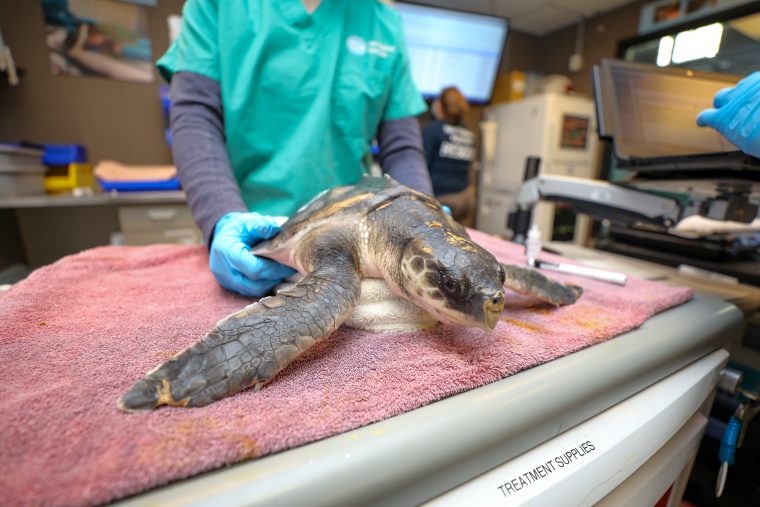“Fusilli” and “Couscous” among group of turtles being treated for pneumonia, bone fractures, eye conditions

BOSTON, MASS. (Jan. 18, 2023) – With the annual sea turtle stranding season coming to a close this month, the New England Aquarium will be rehabilitating more than 60 playfully-named turtles until they are cleared for release back into the ocean.
**PHOTOS AND VIDEO AVAILABLE HERE WITH CREDIT TO NEW ENGLAND AQUARIUM**
The New England Aquarium’s Sea Turtle Hospital in Quincy, MA, cared for more than 500 live sea turtles that had stranded on Cape Cod over the course of the season from November into January. While many stabilized turtles were transferred to secondary rehabilitation facilities to free up space for new arrivals, 64 of the more critical turtles are remaining in Quincy to undergo long-term treatment for life-threatening medical conditions, including pneumonia, sepsis, bone infection, and dehydration, a result of becoming unable to regulate their body temperature in the cold waters of Cape Cod Bay.
“This is always an exciting time for us, focusing our efforts on turtles that will complete their full rehabilitation process here in Quincy. This is when we really get to know and understand the various medical conditions of the individual turtles receiving care at our Sea Turtle Hospital, a process that can take several months before these turtles can be released back into their ocean home,” said Adam Kennedy, Director of Rescue and Rehabilitation.
Aquarium staff, volunteers, and interns have a tradition of naming the turtles receiving months-long care. This year’s naming theme is pasta shapes, with Fusilli, Orzo, and Lasagna among the group. Others inspired by noodle shapes from around the world include Udon, Couscous, and Soba.
In addition to pneumonia and dehydration, many turtles suffer from systemic infections, severe frostbite, gastrointestinal issues, and eye conditions. Aquarium veterinarians work with staff biologists to create individualized treatment plans that may include systemic medication, nebulization, laser therapy, and even acupuncture. Most turtles will complete their rehabilitation within eight months and return to the ocean waters south of Cape Cod in the summertime.
“Many of these turtles have chronic problems secondary to cold-stunning, which often require aggressive medical treatment. These plans are determined with a combination of physical exams, swim observations, bloodwork, X-rays, and potentially advanced diagnostics such as an MRI or exploratory surgery,” said Associate Veterinarian Dr. Melissa Joblon. “At this point in the year, we are now able to provide more focused, individualized and intensive long-term care for our patients, and it’s very rewarding to see them improving over time.”
Each year, hundreds of cold-stunned sea turtles wash up on the beaches of Cape Cod. Because of the rapidly changing water temperature and wind pattern, many turtles cannot escape the hook-like area of Cape Cod Bay before becoming hypothermic. That’s when staff and volunteers with Mass Audubon’s Wellfleet Bay Wildlife Sanctuary come in, patrolling the beaches for stranded turtles and transporting the animals to the New England Aquarium’s Sea Turtle Hospital in Quincy, MA, and National Marine Life Center (NMLC) in Bourne, MA, to be triaged and rehabilitated. As the facilities fill up, the Aquarium works closely with the National Oceanic and Atmospheric Administration (NOAA) Fisheries Service and the non-profit organization Turtles Fly Too to transport some turtles to organizations that can continue the rehabilitation process and free up space for new patients. More than 800 dead and alive turtles washed ashore on Cape Cod beaches from November to January, making it the third-busiest cold stunning season on record. While a vast majority of rescued turtles are critically endangered Kemp’s ridley turtles, a record 53 green sea turtles stranded this season, possibly from hurricane activity in the Atlantic drawing more greens into the Gulf of Maine.
The number of annual cold-stunned sea turtle strandings in Massachusetts varies from year to year but has steadily increased from around 50 in 2000 to more than 800 in 2022. Researchers have predicted through statistical modeling that by 2031, these events will bring thousands of sea turtles to our shores annually. Dozens of organizations across the country have stepped up in recent years to ensure each season is a conservation success for sea turtles.
MEDIA CONTACT:
Pam Bechtold Snyder – psnyder@neaq.org, 617-686-5068
